The Water Challenge is three-dimensional. We face broken pipes, broken policies, and broken economics! Yet, if we get to the bottom of it, the economic one seems to be the root cause of all the other problems. What if Abraham Maslow’s hierarchy of needs actually explained it? That’s what we’ll uncover:
with 🎙️ Tom Rooney – Chairman and Operating Partner at Sciens Water
💧 Sciens is a research-driven investment fund that identifies uncovered, under-researched, or misunderstood water sector opportunities that are undercapitalized.
This episode is part of my Series on the Water Crisis in America
What we covered:
3️⃣ The three dimensions of the Water Problem: Broken Pipes, Broken Policy, and Broken Economics
💰 How one dimension is the root cause of all the others
💸 How one can be 500 times cheaper, chemically identical, yet deemed too expensive
📈 How it’s about time for the Water Sector to get its marketing right and better roll out its value proposition
🤯 How Maslow’s psychological theory explains a lot of the Water Sector’s situation (especially the less-known second half of it)
🧠 How we shall work on the psychology of Water’s Value
😢 How tragedies like Flint and Jacksonville can yield positive returns if we leverage them right
❌ How Joe Biden’s predictions might be wrong (and why)
🤝 How blending Private and Public know-how will deliver the best results (and why)
🏦 How Water can and shall be a profitable field (and what that enables)
⌛ How tackling the water challenges we face and foresee won’t happen overnight
🏎️ Limiting bottled water to a sub-niche, the private sector’s track record, the racecar analogy, … and much more!
🔥 … and of course, we concluded with the 𝙧𝙖𝙥𝙞𝙙 𝙛𝙞𝙧𝙚 𝙦𝙪𝙚𝙨𝙩𝙞𝙤𝙣𝙨 🔥
Resources:
⬇️ I couldn’t find Tom on LinkedIn, but you can reach out to him on…
➡️ … Sciens Water’s website!
➡️ Sciens Water, which I’m happy to thank once again for enabling this episode!
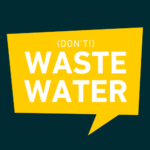
is on Linkedin ➡️
Teaser 1 – How Maslow explains the state of America’s Water
Teaser 2 – How Joe Biden is wrong about Flint and Jacksonville (and why that matters)
Teaser 3 – How America’s Water is a Racecar (and who’s the engine)
Teaser 4 – What’s 500 times cheaper than America’s favorite beverage, has the exact same composition, and is still deemed too expensive?
Full Video: My conversation with Tom Rooney
Table of contents
- What we covered:
- Resources:
- Teaser 1 – How Maslow explains the state of America’s Water
- Teaser 2 – How Joe Biden is wrong about Flint and Jacksonville (and why that matters)
- Teaser 3 – How America’s Water is a Racecar (and who’s the engine)
- Teaser 4 – What’s 500 times cheaper than America’s favorite beverage, has the exact same composition, and is still deemed too expensive?
- Full Video: My conversation with Tom Rooney
- Full Transcript:
- The three-dimensional problem with Water
- Broken Water Economics is the root cause of all subsequent problems
- The Water Sector should get its Marketing principles right
- The psychology of Water’s Value
- Is there a positive impact of disasters like Flint or Jacksonville?
- The Blend of Private and Public strengths probably is the best approach
- Water can be a profitable field (and it’s good news!)
- Rapid Fire Questions
- Other Episodes:
Full Transcript:
These are computer-generated, so expect some typos 🙂
Antoine Walter: Hi Tom, welcome to the show!
Tom Rooney: Hi, thanks for having me.
Antoine Walter: I’m exploring a bit this word of Sciens Water to understand who does what! And how all of that leads to all of us being together here to rethink water. So that’s a bit of what I’d like to explore with you in a minute. Okay, but let’s start with that broad open question.
The three-dimensional problem with Water
What is it that we have to rethink about water?
Tom Rooney: That’s a great question. Many things! What I was speaking about earlier today was the crisis in one city that’s been in the news. That is to say, Jackson, Mississippi, where a lot of people become preoccupied with the pictures they see on television, right?
Broken pipes, people carrying bottled water, politicians finger-pointing and saying it’s his fault or her fault. The message that we brought to this conference, and that I talked about a lot with John Regus and Josiah Cox, is the idea that we have to rethink what the problem really is with water.
Yes, there are broken pipes, and yes, there are systems that don’t work particularly well, but that to resolve the challenges in water, it’s really three-dimensional.
Broken Pipes, Broken Policy and Broken Economics
And the three dimensions that we were talking about are infrastructure. So yes, broken pipes. The second dimension would be what I’ll call broken economics, right? Or the inability to see the water crisis from the true economics that exists behind it. And the third is policy, public policy, or broken policy.
And so what we talk about is the idea that to truly resolve the American water infrastructure crisis, you have to come at it in a three-dimensional frame of mind.
So it’s not simply asking how one fixes a pipe or a pump, or a membrane or a filtration, but how do we fix the misunderstanding that is the economics of water?
And how do we get the public policymakers to rethink how they frame water in the United States? And so, governors pointing fingers at mayors and mayors begging presidents for money is not helpful. And having the EPA, which is a wonderful organization, but an underfunded organization unable to impose the regulations that already exist.
Those are failures of public policy. So you asked a simple question, but our approach and the reason that we are here, we Sciens, and I am here, in particular, is to help the world and certainly American leadership understand that the only way that we’re gonna truly fix something as large as the American. Infrastructure crisis is by understanding it’s really three dimensional.
Broken Water Economics is the root cause of all subsequent problems
Antoine Walter: What is this misunderstanding about the economics of water?
Tom Rooney: That’s a great question! And I think that’s the single issue that creates all the other problems. And the answer to that is that most people perceive water to be free.
You’ll hear some people say, Well, it rained, and water fell out of the sky. God gave us, Well, you hear all kinds of things, right? But at the end of the day, people expect that water is free or close to free.
People don’t get the value of Water
Very few people actually understand the true value of water. And if you don’t understand the value of water, then you become irritated at being charged to get water.
Having said that, A person who has gone without water, like someone trying to cross a desert or someone who lives in an impoverished city like Jackson, Mississippi currently is, they have a profound understanding of the value of water.
But throughout the United States, and I would argue throughout the world, there isn’t a deep enough appreciation for the value of water.
What that does, what that causes is politicians are not willing to invest as heavily in the infrastructure to produce water because they know they would then have to charge for water. And I’ve had many mayors, and many world leaders tell me that they’re not aware of any politician in the history of mankind that ever got elected with votes for spending money on water.
Utility water is 500x cheaper than bottles – yet deemed expensive
So that’s this economic disconnect, right? It’s the human understanding of the value of water. It’s easy to point out things like the average cost of bottled water is about $5 a gallon. Sure, you can buy Evian for $5 for a tiny amount, but generally speaking, the average value for bottled water is $5 a gallon.
The average cost to produce tap water through American infrastructure is slightly less than one penny per gallon. So it’s a massive difference and yet people complain about the price that they have to pay for water! And yet they’ll buy bottled water. And so this all feeds back to the narrative that we humans don’t actually understand how to value water.
And so with that misunderstanding, you’ve got politicians that won’t regulate it correctly. You’ve got utility leaders who won’t invest in the infrastructure. It is the underpinning of all the problems in water. It is this inability to understand what water’s true value is until the day you become desperate for it.
I’d rather talk about what the value is for water than have people have to go through the horrible experience that someone say in Jackson or Flint, Michigan, has got to go through.
The Water Sector should get its Marketing principles right
Antoine Walter: If you look back, in history, before Perrier came to the United States and before the famous advertising with Orson Wells.
Yep. Bottled water was looked at as something which is not that clever. And, like a relic from the past where really you had to bottle water and you had special beliefs in special types of water. Right. Next year or this year, depending on the statistics, there will be more money spent on bottled water in the United States than on utility water.
It’s the first time that those two lines are crossing. To me, it sounds like the bottled water industry has made a brilliant marketing move. Nothing wrong with that. I mean, it’s business after all. And they gained market share because they were good at marketing. So how can we as a sector get inspired by what they did right?
Tom Rooney: Marketing?
Antoine Walter: Yeah. And market utility water, The way it should, because I do get that for some places bottled water is a solution because they simply don’t have tap water. Right? But I don’t believe that 80% of California doesn’t have access to tap water from safe quality. And yet 80% of Californians don’t drink tap water.
What’s Water’s value proposition?
Tom Rooney: So what you have to look at is, what is the real definition of marketing? And to your point, bottled water companies have done a wonderful job of marketing. What they’ve done is they’ve stepped into the void of the incumbent industry, which is water utilities. So as an incumbent, water utilities produced water without doing any marketing whatsoever.
So what’s marketing? Is it a billboard? Is it a press release? No, it’s actually understanding a value proposition, right? There is a value proposition to fairly well anything that is sold, right? And so there is a value proposition for water that the incumbent, which is to say the water industry needs to address, like what is the value of water.
If the Water Industry gets its value proposition right, it has a killer product!
And that’s kind of back to what we were talking about. So it’s a marketing opportunity for the water industry. Now that’s an industry that’s not particularly well equipped for it because, generally speaking, it’s run by municipal leaders and regulators, and so on and so forth. But if the incumbent, which is to say, utilities, want to gain back the market share, they’ll have to compete in the same way that Coke has to compete against Pepsi, which is: tell me what you’re offering to me? What’s the value of the water coming outta my tap?
And if you convince me, and by the way, what that value is, it needs to be clean, reliable, healthy on demand. And it has a profound price differential, less than one penny a gallon versus $5 a gallon. So if the American water utility industry can make the marketing value proposition pitch that you can trust your tap, that it’s going to be reliable. It’s always going to be healthy and of high quality. It will win the battle!
… and bottled water will be limited to a small sub-segment
There will always be one small segment that will be fit by bottled water. That tap water can’t, and that is convenience, right? There’s a value proposition that bottled water has. So if I go out to play tennis on a tennis court, I can’t bring my tap with me.
I can’t bring my shower head, but I can bring a bottle. Well, that’s a tiny niche. If I go camping in the mountains, a tiny niche. We have to remember there is a good role for bottled. But it shouldn’t be anywhere close to the utilities’ one.
So the American water utility industry and all of our players, we need to start putting our marketing hats on and talk value propositions and then rise to the challenge and produce that value.
The psychology of Water’s Value
Antoine Walter: Isn’t there also a psychological bias element to it? Because there is this body of work produced by Richard Shotton, about the behaviors we have in certain circumstances. And he was bringing forward a study on a craft beer, in the UK, I think, where the slogan was Reassuringly expensive.

Like if you really pay your water below 1 cent per gallon, how good can it be?
Tom Rooney: Right. That’s a branding thing, right? So if I was to give away jewelry for pennies, you would, even if it was solid gold, somehow your mind would say, It’s not valuable because if I sold it to you for so little… So a lot of luxury brands sort of artificially increase their price so as to signal value.
I get all of that. I do think the better study to think about would be Abraham Maslow and Maslow’s Theory of Human Motivation. Right. This is interesting because Maslow’s hierarchy of needs, the first rung. You’ve got the food and water, and security and what have you. What’s interesting is there’s a rung below that, which is oxygen, but no one thinks about it…
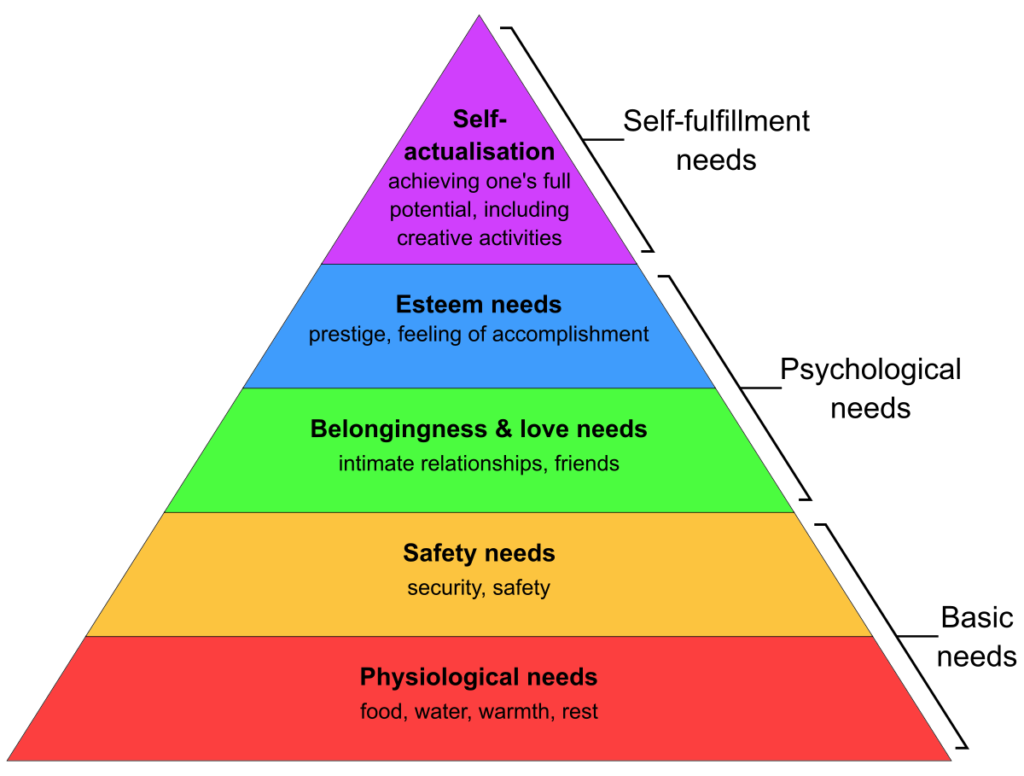
Antoine Walter: …I thought of wifi, but, Okay.
Tom Rooney: Uh, and so, Maslow, in the early 1940s, posited this, and, and I actually, I literally just read his seminal paper over the weekend. What’s interesting about it, and it’s highly relevant to water, is he says, Yeah, okay. So there’s this ladder that the hierarchy of needs above, the basic needs.
You get security and love and on up through realization of yourself and so on. But we’re, we’re really talking the bottom wrong. And like I say, there isn’t a rung beneath it, which is oxygen, but there should be, right? Because absent oxygen. But here’s what Maslow says in the second half of his paper.
Maslow’s hierarchy of needs incredibly explains the broken water economics
That hierarchy needs actually changes situationally. If you take a person who’s spent their entire lives struggling for food, for calories, and desperate situation for 20 years, ultra poor person, that person’s hierarchy of needs actually will cap if you can just give them food security. So in other words, after enough time, Fighting for something you can’t get.
Just getting that and knowing that you’ll securely get that for a long time actually satisfies that person’s eating. They actually don’t need to go any higher.
The converse of that is if a person has lived in an environment where either the food or the water or air is universally available, Too easy to be had for decades on end, the person becomes complacent as to the value of that.
Okay, so here’s where it’s relevant to water. That’s what has happened in the developed world. Certainly with Americans, we’ve had generations 50 years of knowing that we could always go to our taps. There was always water, and so Maslow’s hierarchy of needs was sort of granted.
As we took water for granted we forgot its value
As as relates to water, we lost the perception of the value of the water because it was always there. We never had to struggle for it. We could always get water at the tap. It was always clean, it was always good.
So Maslow actually in the 1940s predicted what is happening now by saying that we all have been so accustomed to water being so easy here in the United States that once the frailties of infrastructure started to break down and we suddenly had occasions where the water wasn’t of quality and whatnot, all of a sudden because we don’t have the value for water because of this complacency that we’ve had, we don’t how to react to it.
And that’s what’s happening in the United States, right.
Is there a positive impact of disasters like Flint or Jacksonville?
Antoine Walter: So somehow take it really from a French perspective. Okay. But there would be positive things in a Flint event or in a Jackson event because all of a sudden something which was taken for granted. Right. I’m not saying it’s positive that people lost their lives.
Not at all. That’s not my point. It’s rather, at some point we needed an awakening. And maybe that was a very costly awakening. But still, it can serve like that if we allow it to be used like that.
Tom Rooney: So to your point, it’s a tragedy that happened in Flint. It’s a tragedy that’s happened and happening in Jackson, Mississippi.
The only way to make that tragedy worse is to not learn from it.
Joe Biden’s prediction might be wrong
We can’t go back and fix Flint before it happened. We can’t fix Jacksonville before it happened, but we can learn from those two events and try as hard as we can to have fewer events in the future.
Joe Biden is doing a wonderful job of running the United States right now, but he was quoted a few weeks ago as saying what happened in Flint, Michigan and what happened in Jackson, Mississippi can never happen again.
Joe Biden is smarter than I am. But regrettably, I don’t think that will turn out to be an accurate statement because there is a tsunami of problems moving forward.
… unless it triggers the right reaction!
A better way to think about what President Biden said would be, we must learn from Jackson. We must learn from Flint and eliminate as much of the possibility of those things.
They’re going to happen, but we need to dig in and ensure that we’ve done every single thing possible so that when the next Jackson or the next Flint happens, and inevitably they will, at least we will be able to say, we learn from Jackson, we learn from Flint, and we did the very best we could to mitigate going forward.
The Blend of Private and Public strengths probably is the best approach
Antoine Walter: I had a bit before you on that microphone, a student, which is here at the conference as a volunteer, and she said that when she entered the conference, she was like, I’m fully for the public. I don’t want private people to touch my water.
Tom Rooney: Right, Right.
Antoine Walter: I recognize that line of thought because I’ve been studying water engineering, and I’m a second-generation water engineer.
I’ve heard that all my life. And what she said is that listening to the people here at the conference, she got convinced that there’s a better approach combining private and public!
If you won one with the conference, is the conference already a success, or how many people do you need to convince about this private-public partnership?
Private Sector involvement has a proven positive track record
Tom Rooney: One of the panel members with me was the CEO of our company called CSWR, and that’s an example where private sector dollars, we completely own and operate water utilities, including half a dozen or so in Mississippi that were as badly broken or worse.
What’s interesting is when we show up in a state as, private money, private equity money, and we say that we want to buy badly broken water utilities in a particular state. We want the worst actors you have, and we want to show what the private sector can do in terms of management.
I think we’ve bought 800 water utility plant operations. And of the 800, they’ve all been way outta compliance. They’ve all been bad actors and whatnot.
We put to work in a blended sense. In other words, state regulators don’t simply say it’s yours, do whatever you want. They have a tremendous say so in how the rate structures are set. There are all kinds of rules about the quality and the outputs and whatnot.
We’re now 800 in a row, proving that using the commercial skills and talent of the private sector, I’ve been able to fix more utilities than the incumbent utility operations.
Public and Private Sectors: the Racecar Analogy
Here’s the analogy that I would give you. American industrial skills and abilities are an amazing force to be brought to bear, but they need to be guided.
So the analogy or the metaphor would be a race car. If you’re trying to develop the fastest race car, you wanna put an engine in it that is of immense horsepower.
That’s American industry. That’s the private sector. The government’s role is the steering wheel, the tires, and that which sits around it.
I wouldn’t give the whole race car to the private sector, and I definitely don’t think the government should be the whole race car. I think American industry should be the engine that propels the car with immense speed, but government, economic regulators, and quality, you know, health and human concerns.
Establishing the right blend
That’s the best of both worlds. You used the word blend. That’s the blend that I would think about. The one thing that government is not particularly strong at is optimizing systems in terms of the spending of the dollars and things like that. That’s where private sector is best, but citizens expect the government to sort of protect it, if you will.
My metaphor is get the most horsepower that you can, but steer it with the government. That’s the blend!
Water can be a profitable field (and it’s good news!)
Antoine Walter: To round our discussion because I have to be cautious of your time at some point. Is it a swear word to say that investing in water can be profitable?
Tom Rooney: No, absolutely not.
Antoine Walter: How do you bring that message across?
Tom Rooney: I graduated from the University of Chicago School of Economics, and I’m a firm believer in free market forces and whatnot, and so the way to bring the interest of industry and commerce is to have a profit.
But it can’t be an unlimited ungoverned profit motive. Greed is not good in this case, but if you try to set a situation up where the private sector has to simply follow the rule book that the government sector did, and just with all of the bureaucracy involved, they won’t optimize anything, right?
Private money optimizes for the Public good
So the private sector optimizing will actually create enough value such that the end customers perceive much greater value.
After the private sector’s there, but not so much that there’s this guilt sense in terms of profit taking, but if you don’t have a profit motive, you really don’t have a commercial motive. The key is to maintain the balance and be able to bring a lot of capital to bear and a lot of efficient capital, and to have a lot of tenacious entrepreneurs trying to find a better way.
Candidly, you look at NASA. NASA is literally historically, one of the greatest engineering accomplishments in the last 100 years. But there are private sector players now that are showing that, you know what, they can actually do it more efficiently than the government.
So there are plenty of examples where the private sector harnessed in the public interests is better than the public interest by itself or the private sector by itself. It’s that blend. Best of both worlds.
From NASA to the Wright Brothers, it’s happening for centuries
Antoine Walter: It’s the story of the Wright Brothers, which made a plane to fly with literally no means, right when there was a government project with a lot of funding, which failed.
So not saying that it’s a universal truth that one is much better than the other. Just saying that… best of both worlds. Yeah.
I have a crystal ball question. If you look forward to the next five or 10 years, what is your metric to say that you had a positive impact?
Tom Rooney: Oh, that’s a great question. So I’ve been in the water industry for 20 years and it feels like Sisyphus pushing the rock up the hill.
Changes will not happen overnight: it’s a long-ball game
To be candid with you, I’m not entirely sure that in five years you’ll see a massive shift. It’ll be mostly a mind shift.
It’ll be a mind shift around the value of water, the utilization of the private sector, the engagement of the EPA and other agencies creating what I’ll call accountability. To me, it really doesn’t matter who’s owning and operating and managing the water utilities as long as somebody is accountable.
If in five years that accountability could be brought to bear in the water sector, I think you’d see a whole lot of the problems we have today. So maybe it’s a piece of that and a greater awareness of the value of water. Subtle but important!
Antoine Walter: To round off these interviews, I have a series of Rapid Fire questions.
Rapid Fire Questions
Here, we’re aiming for short answers, but I’m not cutting the microphone. The first one is, what is the most exciting project you’ve been working on? And why?
Tom Rooney: Four years ago, we launched Central States Water Resources, and it’s just been a spectacular success. It’s gone from a tiny water utility to the fastest-growing water utility in the United States.
12th largest investor-owned. It’s the White Knight Great success story, and I act as chairman of the Board of Central States Water Resources. Sciens owns it. I couldn’t be more proud! We have three other companies now that are in the water space, and hopefully, those will be as successful.
Antoine Walter: What is the one thing that you’re doing today in your job that you won’t be doing
Tom Rooney: in 10 years? I may or may not even be working! How about that?
Antoine Walter: That’s a good answer. Well, Tom, thanks a lot. It was a fascinating deep dive with you and I think your Maslow analogy is one of the most brilliant things I’ve heard in a while. Thanks a lot!
Tom Rooney: Thanks. My pleasure.

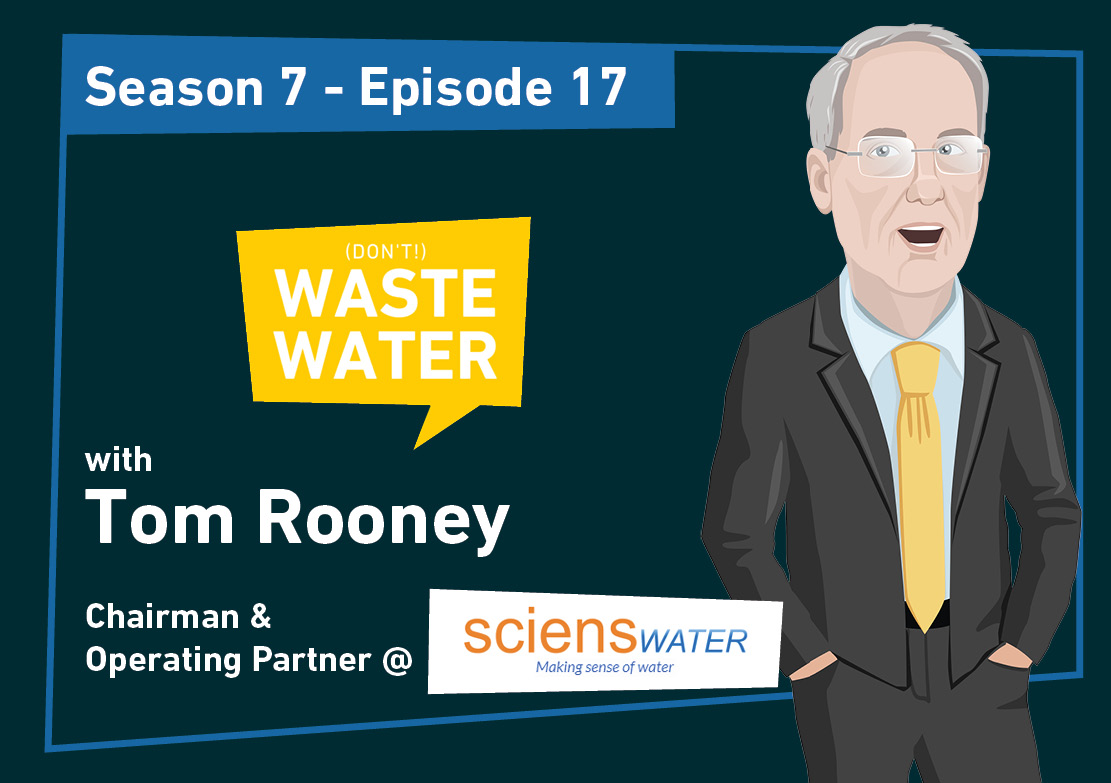

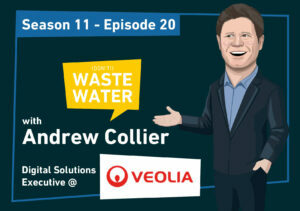


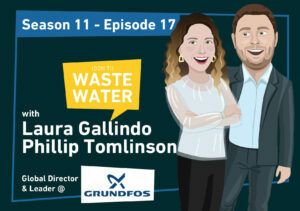
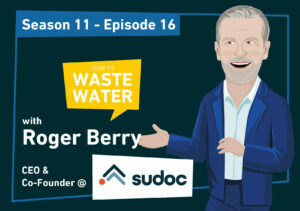

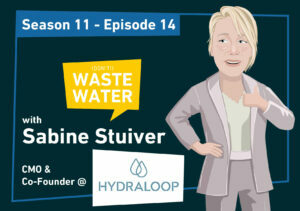
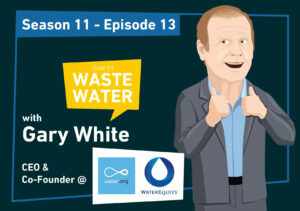
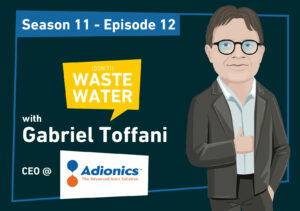
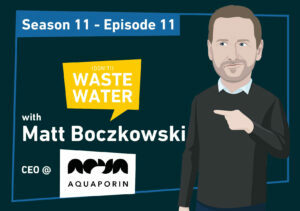
2 thoughts on “How does Maslow explain a lot of America’s Broken Water Economics?”